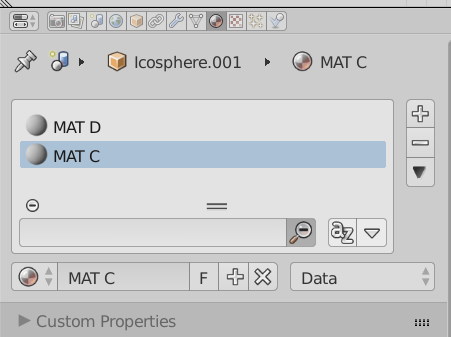I am desperately looking for a scene-wide collections of materials, but I can't find it.
You want scene-wide materials?:
>>> bpy.data.materials[:]
[bpy.data.materials['Material'], bpy.data.materials['Material.001']]
this shows the materials for one object:
>>> bpy.data.objects['Circle'].material_slots[:]
[bpy.data.objects['Circle'].material_slots[0], bpy.data.objects['Circle'].material_slots[1]]
or
>>> [m.name for m in bpy.data.objects['Circle'].material_slots[:]]
['Material.001', 'Material.002']
For completeness then
bpy.data.materials indices
For sake of argument I have a scene with 4 materials
>>> bpy.data.materials[:]
[bpy.data.materials['MAT A'], bpy.data.materials['MAT B'], bpy.data.materials['MAT C'], bpy.data.materials['MAT D']]
We dondon't often need to get the material index (inin the materials collection) of a material, there's no need to because we can use the name (a string) directly to get the reference.
>>> my_material = bpy.data.materials['MAT D']
>>> my_material.name
'MAT D'
If you really wanted to find the index of 'MAT A' in .data.materials, you could do a .find() because material names are allwaysalways unique .
>>> bpy.data.materials.find('MAT A')
0
data.materials is an indexed collection.
>>> bpy.data.materials[0]
bpy.data.materials['MAT A']
material slot indices
The material slotmaterial_slots indices refer to the order in which your materials appear in the object's 'material stack'.

>>> obj = bpy.data.objects['Icosphere']
>>> obj.material_slots[:]
[bpy.data.objects['Icosphere'].material_slots[0], bpy.data.objects['Icosphere'].material_slots[1]]
If you want a direct reference to the material in a slot, boom. its easy too.:
>>> obj.material_slots[:][0].material
bpy.data.materials['MAT A']
No need to get the name first., but if you wanted to:
>>> obj.material_slots[:][0].name
'MAT A'
If the material_slot_indexmaterial_index is 1, and I have two materials referenced by the object references two materials (MAT D and MAT C), then 1 refers to MAT C and globally MAT C is index 2. IIt may be a point of some confusion that the term index is used to talk about the location of an item in two different types of collections.
Different Materials assigned to different faces (directly on mesh)
>>> bpy.data.meshes['Icosphere.001'].polygons[42].material_index
0
this zero refers to the material slot index.
>>> ico_mesh = bpy.data.meshes['Icosphere.001']
>>> idx = ico_mesh.polygons[12].material_index
>>> ico_mesh.materials[idx] # get the reference
bpy.data.materials['MAT D']
